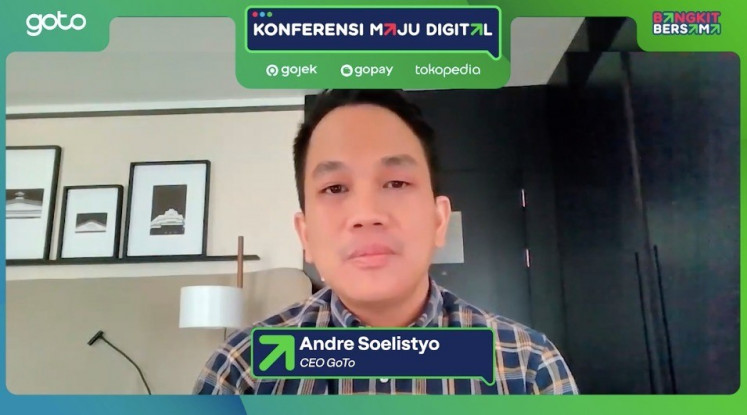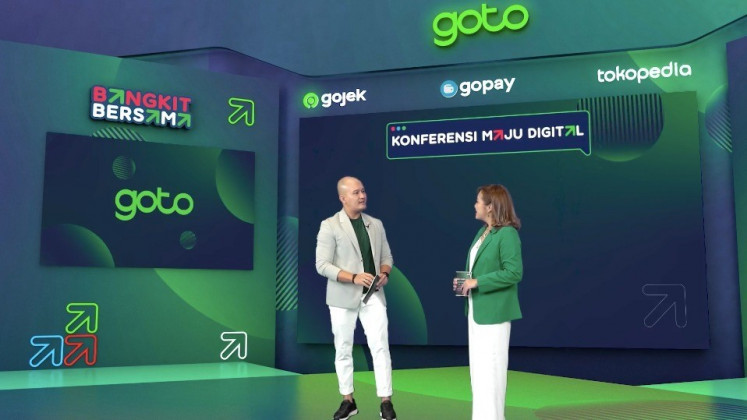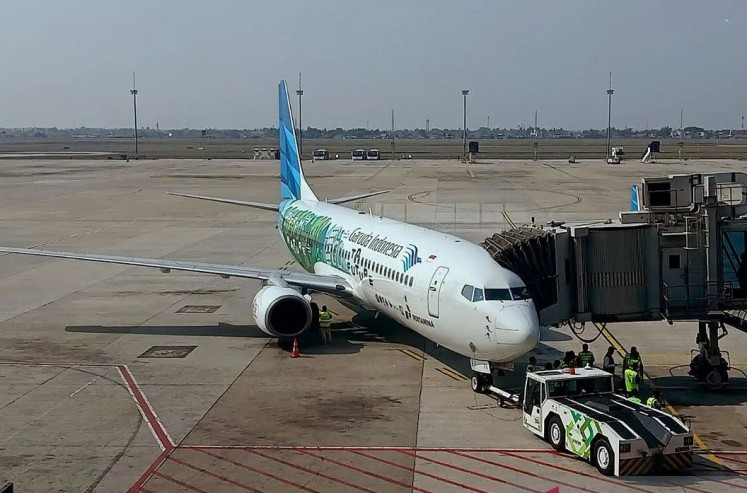Popular Reads
Top Results
Can't find what you're looking for?
View all search resultsPopular Reads
Top Results
Can't find what you're looking for?
View all search resultsGoTo holds first-ever MSME conference to bolster local businesses
GoTo held its first-ever conference for micro, small and medium enterprises (MSME) on the weekend as part of its #BangkitBersama (Rise Together) initiative.
Change text size
Gift Premium Articles
to Anyone
G
oTo held its first-ever conference for micro, small and medium enterprises (MSME) on the weekend as part of its #BangkitBersama (Rise Together) initiative. Titled the National Digital Forward Conference, the event was intended to encourage smallholder actors to take their businesses online in order to grow their audience and profit with the help of Gojek, Tokopedia and GoTo Financial.
Session A was kicked off by speeches from Andre Soelistyo, the CEO of GoTo, and Luhut B. Pandjaitan, maritime affairs and investment minister. Similar to session B, the event was attended by speakers across all sectors who shared their success stories about incorporating digitalization into their brands and included a musical performance by RAN.
Astrid Vega Septyani, sales and operations lead at Tokopedia, spoke on how to build a closer relationship with customers through digital platforms. She spotlighted Tokopedia Play, a streaming platform that can be accessed through the Tokopedia application. Underlining that streaming and broadcast has replaced face-to-face operations, which have been minimized by the pandemic, this could also be the answer to customers who are hesitant to buy products online, she said.
“In 2021, the use of live-streaming is increasing. We even see that every week, each seller creates more content; meaning they see that the potential for live-streaming exists,” Astrid said.
“From live-streaming, the seller can review the product while the buyer is more confident about what kind of product they want to buy.”
The e-commerce giant also provided educational materials for MSMEs on how to attract buyers, tips on using the digital platform, making short, fun, on-demand videos, as well as building rapport with the target audience.
Most shoppers wouldn’t buy a shirt before trying it on in a fitting room, so why would their attitude change just because they moved their shopping online? Further exemplified by the food and beverages industry, most people are more inclined to have their food and supplies delivered through online platforms, such as GoFood and GoMart. The increase in popularity of certain dishes can be seen through watching “mukbang” or ASMR videos online, in which people eat in front of a camera, letting the sound aesthetic translate to viewers as something they have to have right away.
Video platforms, such as Tokopedia Play, can be a medium for small restaurant and supermarket owners to upload videos on how to cook new recipes, how to eat and how to recreate elaborate dishes. Before long, there could be thousands of videos showing viewers how to bake “croffles”, a hybrid of a croissant and waffle, dubbed the “it” snack of the moment. Moreover, like any other industry full of innovation, the food and beverages industry in Indonesia will soon create or adapt another fad that will keep MSMEs busy as they keep up with what the customers desire online.
Astrid also offered a solution on how to avoid imitation from other brands. She highlighted that for an idea to be innovative, it had to be unique and original, brought forth from the products available through the MSME’s own business. As Oscar Wilde said, “Imitation is the sincerest form of flattery that mediocrity can pay to greatness,” which basically proves that something works. Astrid then concluded with the two essential things MSMEs can do to increase brand equity: find a unique selling point and apply for patents to avoid imitation products.
At the other session, Rizky Arief Dwi Prakoso, founder and CEO of HMNS, a perfumery brand started in 2010, gave insights on how to turn an underdog into an industry leader. He credited the brand’s success to identifying a fillable gap in the perfumery sector in the country and implementing the “marketing funnel”, which turns awareness into gaining repeat customers. He also credited social media for HMNS’ growth, by letting customers review their purchases online as a marketing force.
He then talked about competition and collaborations that matter.
“The easiest way to not become a market leader is to think you’re a market leader,” Rizky told the audience during a presentation about having the underdog mentality, revealing that having competition was essential for a business.
For Rizky, competition in the industry is an encouragement for brands to keep innovating. He then continued by explaining that collaboration that matters. Build partnerships that will give brand sustainability by focusing on what clients need, instead of who and/or how famous your partner is, he said. Start by asking how the collaboration can benefit clients. He felt that most brands collaborated in order to go viral.
Furthermore, Rizky is not blind to the hardest part of running a brand that sells perfume through digital platforms, which he said was the biggest obstacle.
“As a brand that exists in cyberspace, it's hard to introduce a new smell to our market, so we’re trying very hard to make people understand the new smell of our perfume through social media or digital platforms,” he said, adding that his customers had to rely on their imagination.
The driving force for HMNS’s growth is selling products based on what customers will want.
“I personally learned from a book; there are many aspects where people choose to buy a product or a brand, and not all of them start from the price and quality of the product,” Rizky said.
“There is one more factor that is somewhat irrational, namely branding. Branding is something we can't explain because it's intangible, it can't be seen. However, the reason why people choose a certain brand of coffee compared to other coffee brands that are much cheaper, the reason why people like certain cars when there are other cars that are of better quality and much cheaper, is a factor of brand image.
“According to us at this time, the brand image that we build at HMNS is about the relationship with our customers. And the relationship is something that is irrational.”
Rizky can also be seen as a risk-taker when it comes to conducting market research.
“The best way is when we have a product, can we sell it immediately to the market? The product is there, the price is there, and that’s how you get the fastest validation: by selling. Then, improve based on that,” he explained.
Noting that the most effective and efficient way to conduct research is to launch a product with low stock.
Lastly, Rizky concluded his session by advising that knowing and understanding your customers was the most important thing for a start-up.
“One thing that I think is the most important part of a brand when we are just starting out is connection; if we connect with our audience, connect with our customers, if we feel we want to create a winning brand or a brand that can compete with other big ones. Maybe if we look at the data, look at the numbers, it will be impossible. […] But if we can build a good relationship with our customers, and they feel they have a good relationship with the brand, without us realizing it, there will be an emotional attachment that they have a tendency to choose us over other brands.”
In order to encourage more MSME owners to collaborate and improve together, the GoTo ecosystem has also created communities for those who want to find out more on how to grow their business and integrate digitalization via three QR codes shown on a screen. They are KOMPAG for GoFood partners, KONTAG for Gojek’s retail community and K-TOP for Tokopedia sellers.












